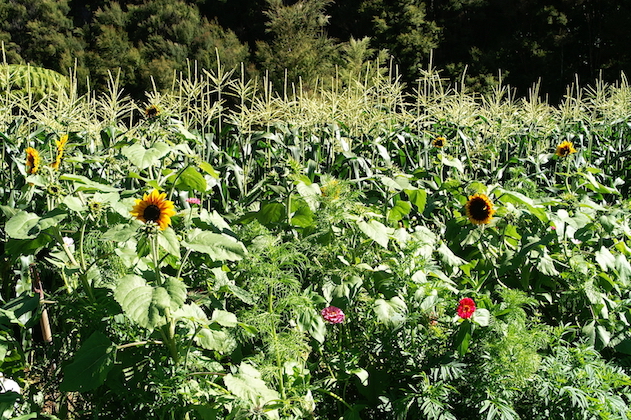Gentle World is a vegan non-profit organization and intentional community that operates two educational centers, one in Hawaii and one in New Zealand, where they garden veganically. Below is an interview conducted by Donna Ashizawa at the New Zealand location, named Shangri-La, with Angel Flinn, Gentle World’s Director of Outreach.
Tell us about the work and mission of Gentle World
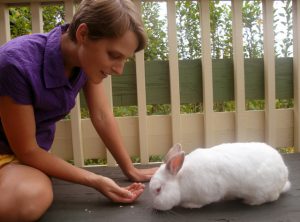
Angel and Poof
Gentle World has been an intentional community for close to 50 years and an educational organization for almost 40 years. Our mission is to help create a more peaceful world by educating the public about the benefits of vegan living, the reasons for being vegan, and how to go about making the transition.
We do that in many different ways: we give workshops on cooking and veganic gardening, one-on-one consultations and seminars, and we’ve even made and shown films. We have an educational website with articles covering all sorts of topics related to veganism. We also have a one-of-a-kind visitor program where people from all over the world come and participate in the maintenance of our two educational centers, in Hawaii and in New Zealand. This gives people the opportunity to learn about veganism along the way, including how to cook and grow food.
When people come here, they often find that there’s something about the environment and the feeling that we’ve created together that makes them feel very at home, comfortable and inspired. It allows them to open up to the vegan message in a different way than, for instance, reading a leaflet or watching a film. It’s an experience of being in a community where being vegan is just the normal way of life and where they are able to see the effects of veganism on people of all different ages who have been vegan for a long time. There have been people who have told us they could never give up meat, and by the time they leave, they had become committed vegans. It’s a beautiful thing to be a part of.
Was veganic gardening an explicit feature of the organization from the beginning?
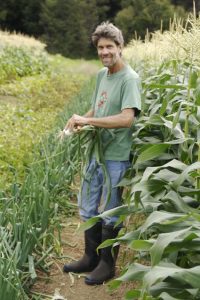
Magic
In a way it was, because when Gentle World started as a community, they wanted to grow their own food, naturally. Being vegan, they wanted to do it in a vegan way, and of course they knew that people normally used manure. I think that because this was so long ago, they didn’t even know that there was such a thing as “veganic”. Whether or not the term existed, it was before they had ever heard of it. So they didn’t call it that, but they were trying to grow food without using animal inputs.
When the community bought the Shangri-La property, they met up with Magic, a New Zealander who has since become a part of the organization. He was a founding member of the Far North Organic Growers Association and was very educated about organic growing, so when they moved onto the land here in New Zealand, he played a big role in the effort to grow food.
At the same time, Butterflies Katz, who is also a longtime member of the community, was learning about how people grew the organic food that she would buy, and she was really appalled by what she was hearing. She decided that we needed to grow as much of our own food as possible, and she teamed up with Magic. Between his knowledge of organics and her knowledge of veganism, they made a very concerted effort to develop veganic growing methods here. Butterflies did a lot of research into fertilizers that don’t involve any animal ingredients at all. She’s written about it extensively and we’ve published a lot of that information on our website. We put a lot of effort into spreading this information.
You host WWOOFers who have prior experience on organic farms. Does their experience at Gentle World shift their perspectives on farming?
I hope so! A lot of people do come to us through the WWOOF program* and because it is an organic farming program, most of their experiences have involved animals in farming, whether they are growing fruits and vegetables with the use of animal by-products, or whether they’re actually farming animals.
If people come here and they are vegan, they are very relieved to be in a situation where there are no animals involved at all. And yes, people often come to us specifically with that intention; they’ve been on farms where organic food is grown and they see animal inputs being used, and they don’t feel comfortable about it. So a lot of people come to us asking, “How do you do this without that?” and what they find is it’s a lot simpler than most people think. All those things that are used – manure and blood and bone and fish emulsion, slaughterhouse sludge, lots and lots of horrible non-vegan ingredients – are very easy to replace. It’s a lot easier to grow food veganically than people expect.
What are some of the ways that farming animals impacts wildlife?
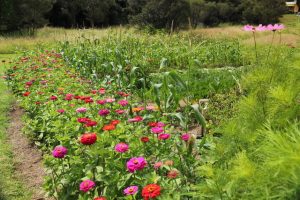 There are many ways it impacts wildlife. The majority of animal products come from large-scale farms. If animals aren’t in factory farms or CAFOs (controlled animal feeding operations), then they are grazing. People think this is better – the ideas of grass-fed and free range are very popular – but what is happening is that farmers are stealing the land from the wildlife to use for cows and whomever else they’re grazing. This often requires killing wild animals through trapping, shooting or “aerial gunning”, poisoning and many other ways. These animals are exterminated so we can use the land to graze food animals. Wild horses are also rounded up; there are many places in the U.S. where wild horses live on the land and they just round them up and corral them so the land can be used to raise cows. It’s horrendous.
There are many ways it impacts wildlife. The majority of animal products come from large-scale farms. If animals aren’t in factory farms or CAFOs (controlled animal feeding operations), then they are grazing. People think this is better – the ideas of grass-fed and free range are very popular – but what is happening is that farmers are stealing the land from the wildlife to use for cows and whomever else they’re grazing. This often requires killing wild animals through trapping, shooting or “aerial gunning”, poisoning and many other ways. These animals are exterminated so we can use the land to graze food animals. Wild horses are also rounded up; there are many places in the U.S. where wild horses live on the land and they just round them up and corral them so the land can be used to raise cows. It’s horrendous.
The other issue is that animal farming is so polluting and destructive to the environment that it destroys the habitats of many endangered species. Even the United Nations has stated in a report that animal farming is the number one contributor to many of our most pressing environmental problems, including species extinction. In the Amazon, huge amounts of land are cleared for animal farming, but animal agriculture is really a problem everywhere. It’s polluting the rivers, which kills all the animals in the river; it’s polluting the oceans, killing all the animals in the oceans. It’s terribly depressing.
How has the land evolved since you founded Gentle World?
Before Gentle World bought the property in New Zealand, it was being used as an animal farm for sheep and cows. You could see the results of it having been used for animals for so long, the ground was really compacted in certain places. Many of the young native trees and shrubs were being eaten away by the animals as they passed through. The river was shackled by barbed-wire fencing.
When Gentle World bought the land, one of the first things they did was remove miles and miles of barbed-wire fencing and take down the structures that had been used for animal farming, a wool shed and a corral. They wanted to dismantle that–just get rid of it completely. One of the beautiful things is that a lot of the pieces from those structures were recycled and actually reused to build the structures of the community here. For instance, we turned the huge posts from the corral into posts for a grape arbor. So we are using it now to grow plant-based food, which feels like such a beautiful transformation.
Another thing is that we’re at the headwaters of two rivers and we are at the edge of a [Dept of Conservation] park so all the area around us is Conservation Reserve. The water flows down the mountainside into our two rivers that are so clean we can drink from them. After Gentle World bought this property and transformed it, the DOC wanted to buy it themselves because they realized it is so pristine that it could be an extension of the park. When it was an animal farm, the animals were polluting the river. When Gentle World turned it into a vegan farm, it was a tremendous benefit for everybody who lives downstream because we keep the river very, very clean.
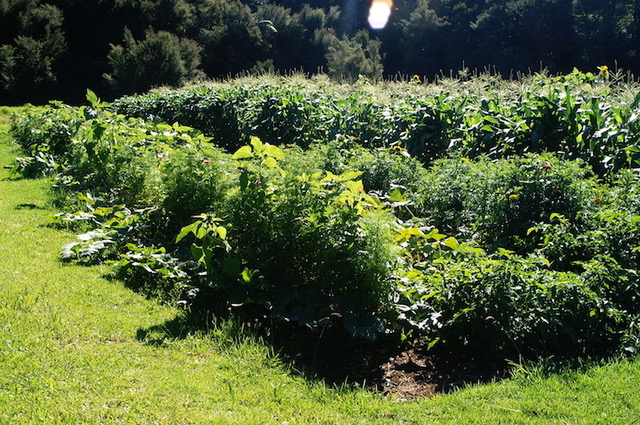
What is practical ecology and why is it part of your educational framework?
Practical ecology is a big part of our core ethical structure. It’s even part of our spirituality I would say, and we believe that spirituality should be practical. We are living on a planet that has limited resources, even though most people act as though that’s not the case. We believe that if everybody lived in accordance to their fair share, that it would be possible to live sustainably.
Practical ecology is about putting that idea into practice–what we do in our lives to make that an ethic by which we live. That includes not buying anything that we don’t need. We keep our consumption to a strict minimum and when we do buy things, we always try to buy them ethically. We buy second hand and look for other ways to acquire something without buying it new. We also take really good care of the things we have so that they last as long as possible, and when they can’t be used for their original purpose anymore, we try to find another purpose for them.
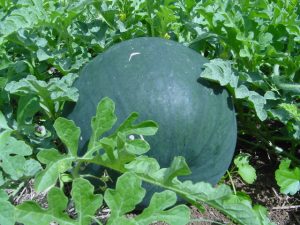
A veganic watermelon nestled in the healed land.
If something really, really, doesn’t have any use anymore, it has to be disposed of, so we recycle as much as we can. If anything goes into the landfill, it’s because we first did everything that we possibly could to save it. That includes repairing, and we go even further and repair other people’s things. If we go to the dump to get rid of something of our own and something is sitting there that is still functional but maybe needs a little repair, we bring it home and rescue it. For instance, people often throw away their fans just because it’s a bit of an effort to open up and clean the inside, but we got all our fans that way and it saves us from having to buy a new one.
We believe that the whole world should be run that way. There should be systems in place in our society where this kind of thing happens as a matter of course. We could lessen and lessen and lessen the amount that we have to take from the earth’s natural resources. Unfortunately that’s not the way the world works – it’s quite the opposite. The system pushes people to consume as much as possible, but we think that if we can do it in our own lives and educate other people about it, we can help lessen our impact.
How do you see the surge in popularity of small-scale, “humane” and “sustainable” animal farming?
I think the popularity of small-scale farming is a natural response to people’s growing awareness of the horrors of large-scale animal farming. People still want to use animal products so they are looking for a way to do it that will assuage their consciences. Of course, the animal industry is very enthusiastic about encouraging people to believe that this is the solution to the horrors of large-scale animal farming. But the fact is, it’s not. Those of us who are vegan know that there is no humane way to slaughter an animal, there’s no humane way to enslave an animal, there’s no way to use an animal for our purposes that would also support their own natural instincts, which really is to be free and live their lives without interference from us.
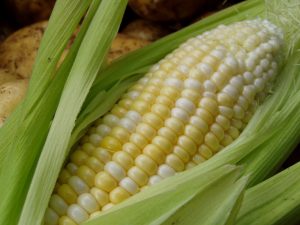
Veganic corn grown at Shangri-La
In a way, it might be a good sign that people are starting to be more aware that animals do suffer in farming situations. It might suggest an evolution in our consciousness as a society, but unfortunately, it also has the effect of making people believe that there is some way that we can continue to have animal products and feel okay about it – that we can have our cake and eat it too. If people just realized that being vegan is a wonderful thing, they would realize that they don’t need those things at all. They would feel tremendously better if they just relieved themselves of the entire burden of having to force animals to serve us in that way.
Regardless of the scale, and regardless of the conditions that an animal is kept in, they still are subjected to many of the same forms of suffering that animals on large-scale operations are. For example, it’s not like the mama cows graze on the field and make milk and then retire and live happily ever after. They all end up being killed. There are practices involved in dairy production that are unavoidable, such as the separation of mother from calf. In egg farming, fifty percent of chicks who hatch are male and are useless to egg farming, so regardless of whether chickens are cage-free, or free-range, or running around the barnyard, their brothers have all been killed. People need to be made more aware of these realities, and I hope that they will realize that there’s just no way to do this in a kind way.
In regards to sustainability: human population is growing and demanding animal products at an increased rate. Especially in the East; people didn’t used to be able to afford many animal products and now they want to live in the same way as people in the West. The demand for animal products is drastically increasing and we can have all we want in smaller-scale situations, but as long as we have to meet this growing demand, it’s going to be just as unsustainable no matter how it’s done. There will be the same amount of pollution and the same amount of resources used, so there’s no way animal agriculture could possibly be sustainable and there certainly is no way it could ever be humane.
What are your thoughts on next steps in the veganic movement?
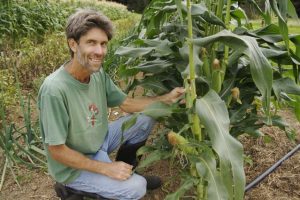 The vegan movement is growing, faster and faster, which is so beautiful. As it does, the demand for veganic products will grow, and I think we’ll see veganic products become economically viable. There are some large-scale veganic farms that sell to the public and, from what I understand, they have sustainable business models. It would be fantastic to see those take off all over the world. As with everything, we need to educate people as much as we can. Change happens, even though when you are vegan, it feels so slow, and sometimes it feels like it’s impossible, but many things in history have seemed impossible at the time. We need to stay inspired that we are on the side of right and we are going to see things break through. We just have to keep ourselves moving forward, and eventually it will all be veganic!
The vegan movement is growing, faster and faster, which is so beautiful. As it does, the demand for veganic products will grow, and I think we’ll see veganic products become economically viable. There are some large-scale veganic farms that sell to the public and, from what I understand, they have sustainable business models. It would be fantastic to see those take off all over the world. As with everything, we need to educate people as much as we can. Change happens, even though when you are vegan, it feels so slow, and sometimes it feels like it’s impossible, but many things in history have seemed impossible at the time. We need to stay inspired that we are on the side of right and we are going to see things break through. We just have to keep ourselves moving forward, and eventually it will all be veganic!
* WWOOF International is a network of organizations that allows people to volunteer and stay at organic farms.
Read more: A Beginner’s Guide to Veganic Gardening
